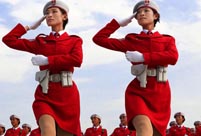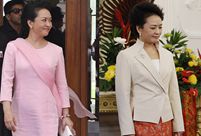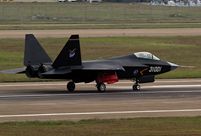 Close-up view of August Aerobatic Team
Close-up view of August Aerobatic Team
 Goddesses married in 2014
Goddesses married in 2014
 Polar region photos raise worldwide awareness of global warming
Polar region photos raise worldwide awareness of global warming
 Get off at the last stop — Beijing Subway in vision
Get off at the last stop — Beijing Subway in vision
 Top 100 beauties in the world!
Top 100 beauties in the world!
 Gallery: Who is the most beautiful one?
Gallery: Who is the most beautiful one?
 If you like autumn, put your hands in the air!
If you like autumn, put your hands in the air!
 Fan Bingbing's "Queen style" in new play
Fan Bingbing's "Queen style" in new play
 Lingerie show at 2014 Miss China
Lingerie show at 2014 Miss China
 J-10 fighters show aerobatic stunts in smog-free sky
J-10 fighters show aerobatic stunts in smog-free sky
The Legal System
Macao’s legal system is founded on a strong tradition of adherence to the rule of law and judicial independence. Under the principle of “One country, two systems”, the Macao Special Administrative Region (MSAR) maintains Continental European law as the foundation of its legal system.
The Basic Law of the Macao Special Administrative Region of the People's Republic of China is the constitutional document for the MSAR, adopted by the National People's Congress (NPC) in accordance with the Constitution of the People’s Republic of China (PRC). The Basic Law sets a foundation for all systems and policies implemented in Macao including its social system, economic system, protection of fundamental rights and freedom, administration, legislation and justice.
Laws of the Macao SAR
The laws presently in force in the Macao SAR include: The Basic Law; National laws listed in Annex III to the Basic Law; Laws that were in effect before 20 December 1999 and which have been retained as laws of the Macao SAR by the Standing Committee of the National People’s Congress; and Laws enacted by the legislature of the Macao SAR.
The Penal Code, Criminal Procedural Code, Civil Code, Civil Procedural Code and Commercial Code, collectively known as the “Five Codes”, form the authoritative framework of Macao’s legal system.
National laws shall not be applied in the Macao SAR, except those listed in Annex III to the Basic Law. Laws listed in Annex III shall be applied locally by way of promulgation or legislation by the Macao SAR. Currently, 11 national laws apply in the Macao SAR.
The Standing Committee of the National People’s Congress may add to or delete from the list of laws in Annex III after consulting its Committee for the Basic Law of the Macao SAR and the MSAR Government. Only those laws relating to defence, foreign affairs and other matters outside the limits of the Region’s autonomy as specified in the Basic Law are to be listed in Annex III to the Basic Law.
Fundamental Rights
The Basic Law safeguards the fundamental rights of the people of Macao. These include the freedom of speech, freedom of the press, freedom of association and assembly, freedom of procession and demonstration, the right to organise and join trade unions and to strike, freedom of religion, freedom to travel, and freedom to enter and leave Macao. Provisions applicable to Macao in the International Covenant on Civil and Political Rights, the International Covenant on Economic, Social and Cultural Rights and a number of international labour conventions also remain in force.
Macao continues to comply with the main international conventions on human rights, including the International Convention on the Elimination of All Forms of Racial Discrimination, Convention Against Torture and Other Cruel, Inhuman or Degrading Treatment or Punishment, Convention on the Rights of the Child, and the Convention on the Elimination of All Forms of Discrimination Against Women.
The Judiciary System
The Basic Law gives the MSAR independent judicial power, including the power of final adjudication. The courts of the MSAR exercise judicial power independently and are subordinated to nothing but the law.
The MSAR has the Court of First Instance, the Court of Second Instance and the Court of Final Appeal. The structure, powers and functions of the courts are established by law.
The Lower Court can form specialised tribunals, as required. The Examining Magistracy has been retained by the SAR Government.
The judges of the courts of the MSAR at all levels are appointed by the Chief Executive, on the recommendation of an independent commission composed of local judges, lawyers and eminent persons. Judges are chosen on the basis of their professional qualifications. Qualified judges of foreign nationality may also be employed. Hence, some Portuguese judges have continued to serve the territory.
The Presidents of the courts of MSAR at all levels are appointed by the Chief Executive from amongst the judges of the courts. The President of the Court of Final Appeal must be a Chinese citizen who is a permanent resident of the MSAR. The Public Prosecutions Office of MSAR exercises its functions as vested by law independently and free from any interference. The Public Prosecutor-General is nominated by the Chief Executive and appointed by the Central People's Government and must be a Chinese citizen who is a permanent resident of MSAR. Public Prosecutors are nominated by the Public Prosecutor-General and appointed by the Chief Executive. The structure, powers and operation of the Public Prosecutions Office are prescribed by law. At present, there are four experienced Portuguese procurators in the procuratorate and one of whom is the Assistant Public Prosecutor-General.
9/2014
(Source: www.gov.mo)
 20 years on: Relocated Three Gorges residents through lens
20 years on: Relocated Three Gorges residents through lens PLA HK Garrison veterans leave behind beautiful smiles
PLA HK Garrison veterans leave behind beautiful smiles Representative beauties of each province in China
Representative beauties of each province in China Chestnut girl goes viral online
Chestnut girl goes viral online Victoria's Secret Fashion Show
Victoria's Secret Fashion Show In photos: Bright and brave female soldier of PLA
In photos: Bright and brave female soldier of PLA China's charming first lady
China's charming first lady Excellent photos of Zhuhai Air Show
Excellent photos of Zhuhai Air Show China's heavyweight aircraft
China's heavyweight aircraft An old problem
An old problem Despite torture report, US escapes censure
Despite torture report, US escapes censure  Inflation hits five-year low
Inflation hits five-year low Runaway brides
Runaway bridesDay|Week|Month